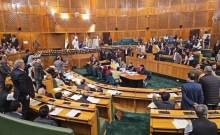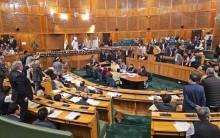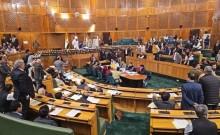![[File Photo] People demonstrate against fresh braid chopping incident in Srinagar on Oct 13, 2017. Kashmir braid](https://data1.ibtimes.co.in/en/full/665572/kashmir-braid.jpg?h=450&l=50&t=40)
Tension prevailed in Kashmir's Kupwara town on Tuesday, October 17, after a mob thrashed a soldier on suspicion of him being involved in a braid-chopping incident. The injured soldier's condition is not critical, a senior Kupwara police official told Hindustan Times.
Some local boys started beating the armyman over allegations that he was involved in braid chopping, the cop said, adding that he was rescued by other soldiers.
Is Kashmir's braid-chopper a figment of people's imagination with its roots in mass-hysteria?
Earlier in the month, a special investigation team was formed by the Jammu and Kashmir police to inquire into the braid chopping incidents. They also announced Rs 6 lakh reward for anyone who gave information helpful for nabbing the culprits.
So far, 40 cases of braid-chopping incidents have been reported in Kashmir valley, a majority from densely populated areas and victims mostly being young girls or middle-aged women.
However, speaking to IBT a few days ago, the Senior Superintendent of Police (SSP) of North Kashmir's Baramulla District, Imtiyaz Hussain, said: "This is nothing but mass hysteria, which has been wrongly propagated in the valley. There are few militant groups and some Pakistani elements who always find ways of instigating unrest in this region."
Imtiyaz added: "The rumors spread in Kashmir valley, over braid chopping are baseless. Separatists and Hurriyat leaders are also taking advantage of the situation and blaming us, the security forces. We have been trying to counsel people in the valley over the braid-chopping for a long time now."
This 'Braid-chopping' goes beyond Kashmir. In a quest to uncover facts about braid-choppers in Delhi, in July, the police commissioned experts from the Institute of Human Behavior and Allied Sciences to study the phenomenon.
Meanwhile a report submitted in August, by Dr Sudhir Khandelwal, former head of the department of psychiatry at New Delhi's All India Institute of Medical Sciences (AIIMS) states that "From all the available evidence, it seems the women are cutting their own hair either consciously or in an altered sensorium, likely to seek attention."
When will we learn! Armyman beaten up by mob in Kupwara, Kashmir. Unconfirmed reports saying airlifted to Srinagar in serious condition. pic.twitter.com/uLIhohsccM
— Rahul Pandita (@rahulpandita) October 17, 2017













